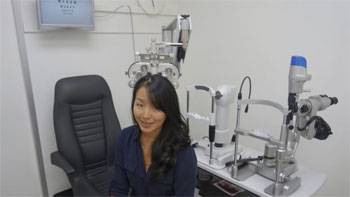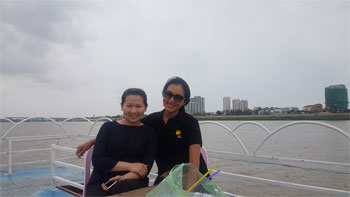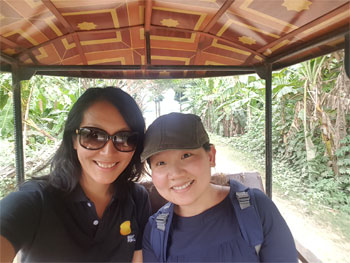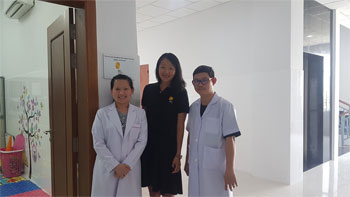Jessica Chi Sight for All Interview

Asia is home to two thirds of the 1.4 million blind children in the world
Asia is home to two thirds of the 1.4 million blind children in the world. What's more alarming is that the main cause of blindness in developing countries are cataract, hence clouding of the lens in the eye, of which most cases can be prevented with the right care.
As an SFA Visionary, Jessica travelled to Cambodia to train local ophthalmologists to properly rehabilitate children after cataract surgery and other ocular conditions.
Interview with Jessica Chi
Question: Currently, what is a typical day like for you, in your clinic?
Jessica Chi: My clinic is a small independent optometry practice located in Carlton, Melbourne. My day would start by catching up with my wonderful staff as we prepare for the day. I would see a broad range of patients, from your simple spectacle checks, to ocular disease management to fitting, and reviewing complex contact lens patient.
Aside from seeing patients, there's the usual admin, ordering and checking off spectacle and contact lens jobs, and general running of the business. The days are generally busy, and they pass very quickly, but I love it. We are really fortunate to have a great team and also have genuinely lovely patients.
Question: What is Sight For All?
Jessica Chi: Sight For All is a not-for-profit eye healthcare charity that raises funds to deliver projects free of charge to developing countries. Through research, education and necessary equipment, Sight For All works to deliver comprehensive, evidence-based and quality eye health care in developing countries. The aim is to reduce vision impairment and blindness, which in turn can break the cycle of poverty.
An example is the project I just returned from in Cambodia. This specific mission was part of a two-year educational project aiming to reduce avoidable blindness among children in Cambodia through specialty contact lens training. This also extended to speciality contact lens fits for conditions, such as irregular cornea that require contact lenses as they cannot be corrected by spectacle, as well as prosthetic contact lens fitting to people with scarred or disfigured eyes.
What a lot of people don't know is that contact lenses are by far the best means of rehabilitation for vision conditions, and sometimes are the only option for these patients. By training Cambodian paediatric ophthalmologists and optometrists, we're hoping to reduce avoidable blindness caused by cataract surgery and corneal conditions.
Question: What inspired you to donate your time to Sight For All?
Jessica Chi: Being short sighted myself from the age of 8, I understand the importance of sight, and what it is like to not have it. In fact, blindness and vision impairment can significantly reduce a person's quality of life and can even lead to an early death.
285 million people in the world are vision impaired and 90% of these live in developing countries. Sadly, the main causes of blindness in developing countries can often be prevented or treated with the right care.
What stood out for me with Sight For All's mission compared to other charity organisations is that they work towards a sustainable solution. This is done through providing local ophthalmologists and optometrists with the training and infrastructure they need to provide eye care for their communities, which is essential for reducing blindness in the long run.
I was fortunate enough to be part of a project in Vietnam in 2014 – where I had the opportunity to teach a team at the Vietnam Institute of Ophthalmology in Hanoi.
Words cannot describe how rewarding that week was. One in particular was watching a 10-month child see for the first time – he had had his cataracts removed but had not been able to obtain spectacles at such a high prescription and had still been essentially blind.
He had been unsettled and unhappy and the second we put contact lenses into his eyes, he just stared, in awe. What really struck me in that moment was that we had the opportunity to do this for one child, but Sight For All was creating the skills so this could go on to help countless other patients.
 Question: How do you hope to fight avoidable blindness among children in developing countries?
Question: How do you hope to fight avoidable blindness among children in developing countries?
Jessica Chi: I believe providing sustainable eye care through an educational approach is key.
Sight For All's approach of training local ophthalmologists, optometrists and nurses in developing countries to provide eye care for their local communities makes complete sense to me. They call this the 'teach a man to fish model", which essentially means to give the community the necessary equipment and skills to be self-sufficient and enable proper eye care.
What was special about this project is that this hospital – the Khmer Soviet Friendship Hospital – had been set up to be a teaching hospital.
During a recent presentation by Sight For All Chairman Dr James Muecke, he said that his mission was to make us Visionaries redundant. I think this is such a noble cause and more importantly, a sustainable one.
Going in as a volunteer to see patients is great for those patients, however once we leave, the rest requiring care will be neglected. Sight For All is about training speciality eye care and having the specialists train future generations of specialists, so quality eye care becomes more accessible and blindness reduces.
Question: Can you tell us about your recent trip to Cambodia?
Jessica Chi: My recent trip to Cambodia was part of Sight For All's Optometry Education Program, which aims to provide training to paediatric ophthalmologists and refractionists in developing countries.
Sight For All conducted an evaluation of the provision of optometry services at the Khmer Soviet Friendship Hospital (KSFH) in Phnom Penh, and found that there was limited capacity to treat infants born with congenital cataracts which must be removed, resulting in aphakia, the absence of the lens of the eye, and suggested the establishment of a contact lens training course at KSFH.
The idea is to send one Australian optometrist – such as myself – with expertise in contact lens prescribing to spend a week every few months in the local clinic, providing hands-on training.
My recent trip was the fifth in my group of contact lens Visionaries. The week was spent providing workshops and lectures to further the specialty contact lens knowledge of this team. We also saw patients, discussed their options and treatment plans.
The hospital has become a constantly evolving place. The building I was in did not exist for the previous Visionaries' visits. The specialty training and the equipment and resources are constantly developing.
 Question: What did you do in Cambodia?
Question: What did you do in Cambodia?
Jessica Chi: As a specialist, I spent time in the clinic conducting comprehensive one-on-one training with Dr Kheng Sok, one of the first Paediatric Ophthalmologists as well as Mr Kith Koeung, a refractionist at KSFH. The idea is to provide enough tools for the trained personnel to be able to train their own colleagues at KSFH.
We reviewed patients that had been prescribed contact lenses by the previous visits and saw new patients and discussed their management.
One patient during the week really stood out. An eight-year-old boy who had managed to find some ammunition and set it off by accident, causing traumatic cataracts in both eyes, shrapnel in his corneas as well as the loss of his right hand. He had been fitted with a contact lens and I asked his carer what it meant to him.
She said that prior to the contact lens, being an active (and cheeky!) boy, he was constantly covered in bruises and cuts as he couldn't see. Now he had the contact lenses, accidents were much less frequent. When I asked him what it meant, he said that before the contact lens, he couldn't play soccer. Now he has the contact lens, he can see the ball.
It was an absolute delight working with Kheng and Kith. They were bright, eager to learn and were extremely accommodating to me.
Overall it was a fantastic week.
Interview by Brooke Hunter
MORE






